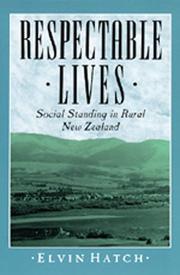| Listing 1 - 10 of 84 | << page >> |
Sort by
|
Book
ISBN: 0710082398 Year: 1975 Publisher: London Routledge
Abstract | Keywords | Export | Availability | Bookmark
 Loading...
Loading...Choose an application
- Reference Manager
- EndNote
- RefWorks (Direct export to RefWorks)
Sociology of occupations --- Industrial sociology. --- Occupational prestige. --- Occupations.
Book
ISBN: 2706126663 2706126671 9782706126666 Year: 2017 Publisher: Fontaine : Presses Universitaires de Grenoble,
Abstract | Keywords | Export | Availability | Bookmark
 Loading...
Loading...Choose an application
- Reference Manager
- EndNote
- RefWorks (Direct export to RefWorks)
Une analyse très complète du processus de l'influence sociale, pour comprendre toute la complexité de ce phénomène. Nous revendiquons rarement le fait d'être influençables. Pourtant, en 1956, des études célèbres de Solomon Asch ont mis en lumière le fait que la vie en société nous met en permanence sous influence, qu'on en soit d'ailleurs conscient ou non. L'influence, ce n'est pas forcément de la manipulation : on peut être influencé par imitation, volontaire ou inconsciente. Dans la construction d'un consensus, on peut être influencé par la fonction normative, conformisante du groupe. L'influence participe ainsi du contrôle social, et crée de l'adhésion. On peut encore être influencé dans le cadre d'échange d'idées, d'acquisition de connaissances, de débats et de construction contradictoire d'opinions. L'influence concerne donc aussi l'apprentissage, l'innovation et la créativité. Cet ouvrage permet de découvrir et d'approfondir le concept d'influence sociale. Il intéressera à la fois étudiants et chercheurs en psychologie, en communication, en management, en marketing, mais aussi tout public intéressé par la compréhension de ces phénomènes.
Social influence. --- Influence (Psychology) --- Social psychology --- Prestige --- Social pressure

ISBN: 0198272634 Year: 1986 Publisher: Oxford Clarendon
Abstract | Keywords | Export | Availability | Bookmark
 Loading...
Loading...Choose an application
- Reference Manager
- EndNote
- RefWorks (Direct export to RefWorks)
Class consciousness. --- Husbands --- Married women --- Occupational prestige. --- Professions --- Employment. --- Sociological aspects. --- Class consciousness --- Occupational prestige --- Sociology of professions --- Job status (Occupational prestige) --- Occupational hierarchy --- Occupational status (Occupational prestige) --- Wives --- Working wives --- Employment --- Sociological aspects --- Sociology --- Prestige --- Men --- Spouses --- Househusbands --- Married men --- Consciousness --- Social perception --- Social classes

ISBN: 0520911431 058513068X 0520074734 0520074726 9780520911437 9780585130682 Year: 1992 Publisher: Berkeley, Calif. ; London : University of California Press,
Abstract | Keywords | Export | Availability | Bookmark
 Loading...
Loading...Choose an application
- Reference Manager
- EndNote
- RefWorks (Direct export to RefWorks)
Where do we get our notions of social hierarchy and personal worth? What underlies our beliefs about the goals worth aiming for, the persons we hope to become? Elvin Hatch addresses these questions in his ethnography of a small New Zealand farming community, articulating the cultural system beneath the local social hierarchy. Hatch argues that, like people everywhere, these New Zealanders care very much about respectability, and he sets out to understand what that means to them. Hatch describes a complex body of thought, which he calls a cultural theory of social hierarchy, that defines not only the local system of social rank, but personhood as well. Because people define respectability differently and try to advance their definitions over those of others, a crucial part of Hatch's approach is to examine the processes by which these differences are worked out over time. Other social scientists posit a natural, universal human tendency to admire certain qualities, such as wealth or power, which they claim are easily identifiable in any society. Hatch argues against this view, showing that any given social hierarchy is not "natural" but culturally constructed and can be seen only when viewed from the local perspective. The observer cannot "see" the hierarchical order without entering into the cultural world of the people themselves. The concept of occupation is central to Hatch's analysis, since the work that people do provides the skeletal framework of the hierarchical order. He focuses in particular on sheep farming and compares his New Zealand community with one in California. Wealth and respectability among farmers are defined differently in the two places, with the result that California landholders perceive a social hierarchy different from the New Zealanders'. Thus the distinctive "shape" that characterizes the hierarchy among these New Zealand landholders and their conceptions of self reflect the distinctive cultural theory by which they live.
Social structure --- Occupational prestige --- Sociology & Social History --- Social Sciences --- Social Conditions --- Canterbury (N.Z.) --- Rural conditions. --- Job status (Occupational prestige) --- Occupational hierarchy --- Occupational status (Occupational prestige) --- Organization, Social --- Social organization --- Canterbury, N.Z. --- Canterbury Region (N.Z.) --- Prestige --- Anthropology --- Sociology --- Social institutions --- Aorangi (N.Z.)
Book
ISBN: 0199311447 0199913994 9780199913992 9780199311446 9780199913985 0199913986 Year: 2013 Publisher: Oxford : Oxford University Press,
Abstract | Keywords | Export | Availability | Bookmark
 Loading...
Loading...Choose an application
- Reference Manager
- EndNote
- RefWorks (Direct export to RefWorks)
This book examines the ways in which cultural arguments about value develop: the processes by which some practices, artists, and media in the artworld win and others lose. The authors argue that the concept of prestige, although uncomfortable and consistently overlooked, is an essential model for understanding artworld values.
Art and society. --- Prestige. --- Group values (Sociology) --- Social values --- Social psychology --- Social influence --- Art --- Art and sociology --- Society and art --- Sociology and art --- Social aspects --- Prestige --- Art et société

ISBN: 0761970924 0761970932 9786610308484 1446220761 1446233596 1280308486 1412933854 9781412933858 9780761970934 9781280308482 9781446220764 9781446233597 6610308489 9780761970927 Year: 2001 Publisher: London ; Thousand Oaks, Calif. : SAGE,
Abstract | Keywords | Export | Availability | Bookmark
 Loading...
Loading...Choose an application
- Reference Manager
- EndNote
- RefWorks (Direct export to RefWorks)
Challenging mainstream accounts of organisational behaviour and management, which treat gender as an optional extra, this volume suggests other ways of understanding the issues.
Organizational behavior. --- Psychology, Industrial. --- Sex role in the work environment. --- Sex role. --- Women --- Arbeids- en organisatiepsychologie --- Employment. --- Handboeken en inleidingen. --- Gender role --- Sex (Psychology) --- Sex differences (Psychology) --- Social role --- Gender expression --- Sexism --- Behavior in organizations --- Management --- Organization --- Psychology, Industrial --- Social psychology --- Occupational prestige --- Sex differences. --- Job status (Occupational prestige) --- Occupational hierarchy --- Occupational status (Occupational prestige) --- Prestige --- Gender roles --- Gendered role --- Gendered roles --- Role, Gender --- Role, Gendered --- Role, Sex --- Roles, Gender --- Roles, Gendered --- Roles, Sex --- Sex roles

ISBN: 1280328134 0203133412 0203171500 9780203171509 9780203133415 9780415186582 0415186587 9780415186599 0415186595 9786610328130 6610328137 9781280328138 9781134663576 1134663579 9781134663521 1134663528 9781134663569 1134663560 Year: 1999 Publisher: London ; New York : Routledge,
Abstract | Keywords | Export | Availability | Bookmark
 Loading...
Loading...Choose an application
- Reference Manager
- EndNote
- RefWorks (Direct export to RefWorks)
Social Influences looks at how we perceive ourselves and others and how this can influence our behaviour. It includes stereotyping and prejudice, obedience and conformity, collective behaviour and leadership.
Social influence. --- Influence (Psychology) --- Psychology --- Conformity --- Example --- Persuasion (Psychology) --- Social psychology --- Prestige --- Social pressure --- Social influence --- #PBIB:2004.4
Book
ISBN: 1617614610 1617616249 9781617616242 9781617614613 Year: 2011 Publisher: New York : Nova Science Publishers,
Abstract | Keywords | Export | Availability | Bookmark
 Loading...
Loading...Choose an application
- Reference Manager
- EndNote
- RefWorks (Direct export to RefWorks)
Leadership. --- Social influence. --- Leadership --- Sociology & Social History --- Social Sciences --- Social Change --- Influence (Psychology) --- Social psychology --- Prestige --- Social pressure --- Ability --- Command of troops --- Followership --- E-books
Book
ISBN: 1400846536 0691138133 0691195978 9781400846535 1299606873 9781299606876 9780691138138 Year: 2013 Publisher: Princeton, N.J. : Princeton University Press,
Abstract | Keywords | Export | Availability | Bookmark
 Loading...
Loading...Choose an application
- Reference Manager
- EndNote
- RefWorks (Direct export to RefWorks)
Ancient Greek literature, Athenian civic ideology, and modern classical scholarship have all worked together to reinforce the idea that there were three neatly defined status groups in classical Athens--citizens, slaves, and resident foreigners. But this book--the first comprehensive account of status in ancient democratic Athens--clearly lays out the evidence for a much broader and more complex spectrum of statuses, one that has important implications for understanding Greek social and cultural history. By revealing a social and legal reality otherwise masked by Athenian ideology, Deborah Kamen illuminates the complexity of Athenian social structure, uncovers tensions between democratic ideology and practice, and contributes to larger questions about the relationship between citizenship and democracy. Each chapter is devoted to one of ten distinct status groups in classical Athens (451/0-323 BCE): chattel slaves, privileged chattel slaves, conditionally freed slaves, resident foreigners (metics), privileged metics, bastards, disenfranchised citizens, naturalized citizens, female citizens, and male citizens. Examining a wide range of literary, epigraphic, and legal evidence, as well as factors not generally considered together, such as property ownership, corporal inviolability, and religious rights, the book demonstrates the important legal and social distinctions that were drawn between various groups of individuals in Athens. At the same time, it reveals that the boundaries between these groups were less fixed and more permeable than Athenians themselves acknowledged. The book concludes by trying to explain why ancient Greek literature maintains the fiction of three status groups despite a far more complex reality.
Social status --- Social standing --- Socio-economic status --- Socioeconomic status --- Standing, Social --- Status, Social --- History. --- Athens (Greece) --- Greece --- Social conditions. --- Social conditions --- Power (Social sciences) --- Prestige
Book
ISBN: 0190255919 1283427737 9786613427731 0199876681 9780199876686 9781283427739 9780190255916 9780199313976 0199313970 9780199743056 0199743053 Year: 2012 Publisher: Oxford, [England] ; New York, New York : Oxford University Press,
Abstract | Keywords | Export | Availability | Bookmark
 Loading...
Loading...Choose an application
- Reference Manager
- EndNote
- RefWorks (Direct export to RefWorks)
Over the course of the last four decades, Robert Cialdini's work has helped spark an intellectual revolution in which social psychological ideas have become increasingly influential. The concepts presented in his book, Influence: The Psychology of Persuasion, have spread well beyond the geographic boundaries of North America and beyond the field of academic social psychology into the areas of business, health, and politics. In this book, leading authors, who represent many different countries and disciplines, explore new developments and the widespread impact of Cialdini's work in research are
Persuasion (Psychology) --- Influence (Psychology) --- Social influence. --- Social psychology --- Prestige --- Social pressure --- Psychology --- Conformity --- Example --- Communication --- Psychology, Applied --- Propaganda --- Cialdini, Robert B. --- チャルディーニ, ロバート B --- Influence (Psychology). --- Persuasion (Psychology).
| Listing 1 - 10 of 84 | << page >> |
Sort by
|

 Search
Search Feedback
Feedback About UniCat
About UniCat  Help
Help News
News